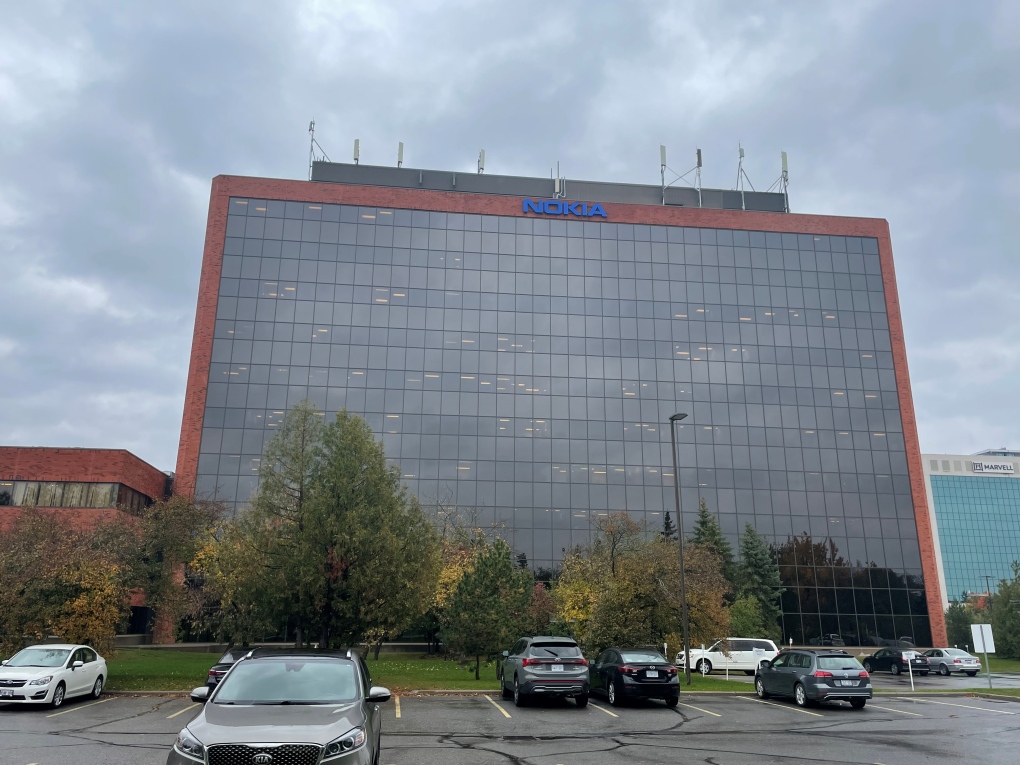Nokia to transform 26-acre Kanata campus
 Nokia's Kanata campus on March Road on Monday, Oct. 17, 2022. (Peter Szperling/CTV News Ottawa)
Nokia's Kanata campus on March Road on Monday, Oct. 17, 2022. (Peter Szperling/CTV News Ottawa)
Three levels of government are planning to pitch in more than $70 million for a massive expansion of Nokia’s Kanata campus.
Prime Minister Justin Trudeau and Premier Doug Ford joined Nokia President and CEO Pekka Lundmark and Nokia Canada President Jeffrey Maddox for the announcement on Monday.
“This is an exciting announcement that will help us advance 5G technology,” Trudeau told reporters. “This is a project that will build a world-class R&D hub that will transform the wireless technologies we rely on every day.”
Nokia said in a news release the hub will expand the company’s capacity in next-generation information and communications technology (ICT) and cyber security innovation. It will add 340 jobs and help the company attract high-end talent to Canada, the release said.
“This project will transform Nokia Canada’s 26-acre campus at the Kanata North Business Park into a sustainable, accessible mixed-use corporate, residential and commercial hub,” the news release said.
“The new R&D hub will help secure Canada’s position as a global leader in the green digital future by broadening Nokia Canada’s expertise in 5G, cyber security, artificial intelligence (AI) and machine learning, accelerating growth in cloud software, and enhancing digital identity management and security for devices connected to critical networks.”
Ottawa is already home to one of Nokia's largest research and development sites, with more than 2,300 employees working at its campus on March Road.
Development application documents show a new 500,000-square-foot complex would include retail and commercial stores along with two office towers. Nokia would also replace its existing office buildings with 11 residential towers featuring a total of 1,900 units.
The Ontario government is contributing $30 million to the project. The federal government is “finalizing plans” to contribute up to $40 million, Nokia said in the news release. The city of Ottawa will contribute $2 million via Hydro Ottawa upgrades.
“The Kanata North technology hub will compete as a global tech leader for decades to come,” Premier Doug Ford said on Monday. “Watch out Silicon Valley: we’re coming.”
Nokia says construction will begin next year, with the facility opening in 2026.
CTVNews.ca Top Stories

W5 Investigates A 'ticking time bomb': Inside Syria's toughest prison holding accused high-ranking ISIS members
In the last of a three-part investigation, W5's Avery Haines was given rare access to a Syrian prison, where thousands of accused high-ranking ISIS members are being held.
Trudeau Liberals' two-month GST holiday bill passes the House, off to the Senate
The federal government's five-page piece of legislation to enact Prime Minister Justin Trudeau's promised two-month tax break on a range of consumer goods over the holidays passed in the House of Commons late Thursday.
Irregular sleep patterns may raise risk of heart attack and stroke, study suggests
Sleeping and waking up at different times is associated with an increased risk of heart attack and stroke, even for people who get the recommended amount of sleep, according to new research.
California man who went missing for 25 years found after sister sees his picture in the news
It’s a Thanksgiving miracle for one California family after a man who went missing in 1999 was found 25 years later when his sister saw a photo of him in an online article, authorities said.
As Australia bans social media for children, Quebec is paying close attention
As Australia moves to ban social media for children under 16, Quebec is debating whether to follow suit.
Notre Dame Cathedral: Sneak peak ahead of the reopening
After more than five years of frenetic reconstruction work, Notre Dame Cathedral showed its new self to the world Friday, with rebuilt soaring ceilings and creamy good-as-new stonework erasing somber memories of its devastating fire in 2019.
Canada Post temporarily laying off striking workers, union says
The union representing Canada Post workers says the Crown corporation has been laying off striking employees as the labour action by more than 55,000 workers approaches the two-week mark.
Can't resist Black Friday weekend deals? How to shop while staying within your budget
A budgeting expert says there are a number of ways shoppers can avoid getting enveloped by the sales frenzy and resist spending beyond their means.
Montreal shopping mall playing 'Baby Shark' song to prevent unhoused from loitering
A shopping mall and office complex in downtown Montreal is being criticized for using the popular children's song 'Baby Shark' to discourage unhoused people from loitering in its emergency exit stairwells.

































